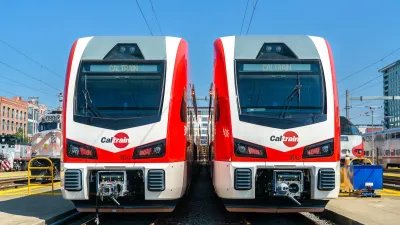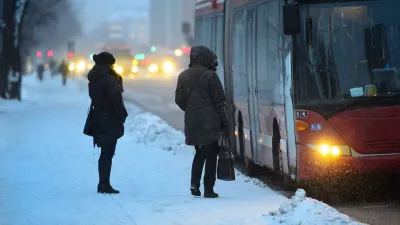When it comes to ignoring matters of housing affordability and public transit during an election cycle of great significance, the United States is not the exception. Candidates in Canada's 2019 Federal Election have mastered the same trick.

Matt Elliott reports from Canada, which is in the throes of a heated election to decide the next prime minister (or whether to elect the same prime minister to a second term).
Like the much maligned lack of focus on issues of urban issues on the debate stage in the Democratic primary, Elliott notes a conspicuous lack of discussion on subjects that dominate the concern in local governments: housing and transit.
In a recent federal leaders debate, the word housing was only spoken ten times, according to Elliott's count, and transit twice.
There’s good reason to want and demand more discussion of these issues in the federal campaign.
Yes, sure, they’re critically important to Toronto. The TTC is currently trying to scratch together a whopping $23.7 billion by 2033 just to keep existing infrastructure in working condition. Meanwhile, the median price of a home in Toronto is more than $900,000, and the city’s jam-packed shelters suggest a whole lot of people can’t come anywhere close to affording that.
But wanting more focus on these issues isn’t just a whiny centre-of-the-universe Toronto thing. Because affordable housing and transit policy are also critical to responding to an issue federal leaders have spent time talking about: climate change.
Elliott does credit the major parties for including policy proposals on the subjects of housing and transit in their platforms (the Democratic candidates for president have also spilled plenty of ink, if not debate time, to those issues), but laments that those ideas haven't been debated publicly.
FULL STORY: Hey, where’s all the federal election talk about transit and housing?

Alabama: Trump Terminates Settlements for Black Communities Harmed By Raw Sewage
Trump deemed the landmark civil rights agreement “illegal DEI and environmental justice policy.”

Planetizen Federal Action Tracker
A weekly monitor of how Trump’s orders and actions are impacting planners and planning in America.

Why Should We Subsidize Public Transportation?
Many public transit agencies face financial stress due to rising costs, declining fare revenue, and declining subsidies. Transit advocates must provide a strong business case for increasing public transit funding.

Understanding Road Diets
An explainer from Momentum highlights the advantages of reducing vehicle lanes in favor of more bike, transit, and pedestrian infrastructure.

New California Law Regulates Warehouse Pollution
A new law tightens building and emissions regulations for large distribution warehouses to mitigate air pollution and traffic in surrounding communities.

Phoenix Announces Opening Date for Light Rail Extension
The South Central extension will connect South Phoenix to downtown and other major hubs starting on June 7.
Urban Design for Planners 1: Software Tools
This six-course series explores essential urban design concepts using open source software and equips planners with the tools they need to participate fully in the urban design process.
Planning for Universal Design
Learn the tools for implementing Universal Design in planning regulations.
Caltrans
Smith Gee Studio
Institute for Housing and Urban Development Studies (IHS)
City of Grandview
Harvard GSD Executive Education
Toledo-Lucas County Plan Commissions
Salt Lake City
NYU Wagner Graduate School of Public Service





























